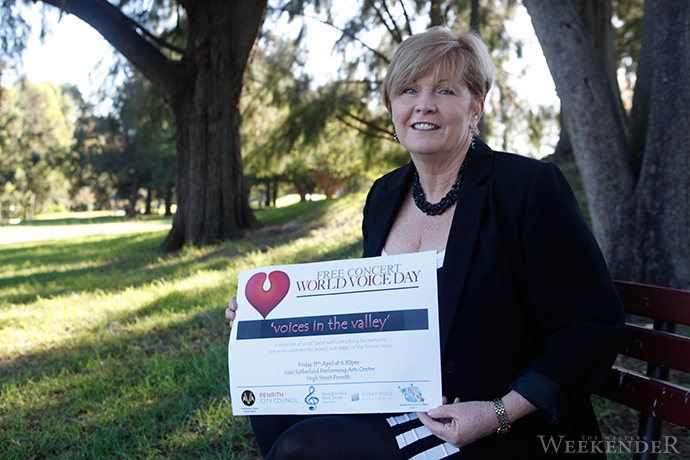When Louise Bale lost her voice, she lost her old life – the one where she was a self confessed “chatterbox”, where she was able to pick up a telephone and answer it with a ‘hello’, where she could order a cappuccino over the counter without having to write her order on a napkin.
In her 40’s – the prime of her life – Ms Bale did not think twice about her voice, how much she was using it and how valuable it was to her.
Simple tasks like ordering takeaway and using a car park intercom were just that, simple.
At a time in life when it seemed like everything was going right, the unexpected happened – Ms Bale’s voice failed her.
It began to let her down slowly, fading in and out. She describes it as a similar sensation to the one you get when talking to someone on a mobile phone with poor reception – cutting out randomly.
Speaking became increasingly tiring as it took more and more effort to get each word out, resulting in her voice becoming incredibly soft.
The muscles supporting her larynx, otherwise known as the voice box, had begun to work inefficiently, causing her voice to fail; a neurological condition called Spasmodic Dysphonia.
The condition’s symptoms can be improved with certain treatments but never reversed, as there is no current cure.
Now 55-years-old, it has been eight years since Ms Bale’s diagnosis and if given the opportunity, she would “absolutely” take her voice and her old life back, but at this stage it will never happen.
“Losing my voice meant that life changed dramatically for me. I have always been a chatterbox, with plenty to say – I am a very social being,” she said.
Corresponding with the Weekender via email, as a phone call would be near impossible with her voice disorder, Ms Bale’s natural social skills were glaringly obvious, and that’s something difficult to translate through writing.
“It’s lucky I like to write,” she joked.
She relies on text messaging, emails and face to face meetings, providing they take place in a very quiet location, to communicate.
But with only a whisper for a voice, social interaction in both her home life and her work life – where she has built a career in health promotion – is difficult and has taken its toll.
“I’ve had some funny (and not so funny) experiences where I have been locked in car parks and buildings where there was an intercom and I needed to get out but I couldn’t be heard,” she said.
“Over the years I have found myself withdrawing from situations that I would normally love, and have become very selective about how and with whom I spend my time.”
“It’s easy to feel invisible in a noisy environment – it gets me down at times, however I am a fairly resilient person and refuse to be beaten, so I can usually bounce back.”
Adding to the “invisible” feeling is the judgement she receives from people in the public, the majority of us in fact, that don’t understand voice disorders.
“Often if you have an unusual voice people think you are uneducated. I have been thought of as having an intellectual impairment and asked more than once if I am deaf,” she said.
“It has shown me a lot about being ‘different’. I have worked in health and welfare for years and I have always been an advocate for people who are on the margins of our society. I think this has given me an even better understanding of how they can be made to feel because they don’t quite ‘fit the mould’.”
This is just one of the lessons Ms Bale’s journey with Spasmodic Dysphonia has taught her – her voice may be gone but without it she has developed new understandings and a new view of life.
“We are a loud and impatient society where people often don’t take the time to really ‘listen’. If you can’t be loud enough to be heard, and jump in to say your piece then your opinion is often overlooked,” she said.
Because of this, she now makes a conscious effort to be the listener in a conversation, to take in what she is being told.
To Ms Bale, her situation is a real life case of ‘you don’t know what you’ve got until it’s gone’, and certainly, we all take our voices for granted.
Among the things she has learnt, the value of communication through voice and its often overlooked importance in life, is the one lesson that has made the biggest impact on Ms Bale and is the one she wants people to remember.
It is because of this that she became involved with World Voice Day, an annual celebration of the human voice.
“It brings us a multitude of great things, like entertainment, education, communication and the ability to express our emotions,” she said.
“For me, World Voice Day is really about getting people to stop for a minute and think about it. We all take it for granted that when we have something to say, we just open our mouth and it happens.”
The initiative began in Brazil in 1999 and has snowballed to an event that is celebrated internationally on April 16.
This year, the annual initiative is being supported by Penrith City Council, with the help of Nordoff-Robbins Music Therapy Centre, Penrith International School of Music, Sydney Voice and Swallowing clinic as well as the Australian Voice Association.
An inaugural concert called ‘Voices in the Valley’ will be held at the Joan Sutherland Centre on Friday, April 11, from 6.30pm, showcasing the “beauty and uniqueness” of the human voice – a reminder of what can so easily be lost.

